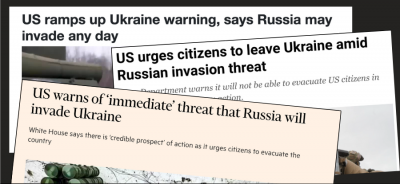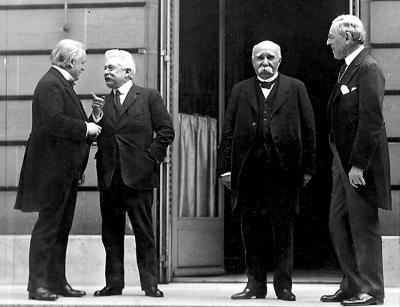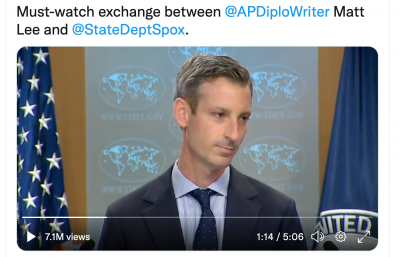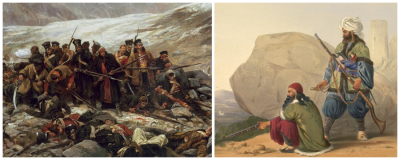
Chatham House is the home of the Royal Institute of International Affairs, which describes itself as an "independent research agency"; however, it is well-known as a propaganda arm of British intelligence. It was founded in 1920, at a session which included British and U.S. participants at the Paris Peace Conference. The same group of "experts" was responsible for the founding of the U.S. Council on Foreign Affairs one year later. The Atlantic Council was formed in 1961, to strengthen U.S.-European cooperation under the banner of "Atlanticism". Though based in the U.S., it receives substantial funding from the British government, as well as from the corporate donors of the "Military Industrial Complex." In 2018, for example, the two leading donors were the government of the U.K. and Facebook.

The "Big Four" (Britain, USA, Italy, France) at the Paris Conference 1920, these were the main architects of the Versailles Treaty.
Furthest left is David Lloyd George, Britain. Furthest on the right is Woodrow Wilson, USA.
The pattern of war propaganda coming from these two think tanks shows they serve both as a megaphone to propagate the "talking points" of the Trans-Atlantic governments in their demonization of Russia and China, and in producing the narratives they employ to control the discussion. As such, they play a crucial role in what former CIA agent and anti-war activist Ray Mcgovern calls the "MICIMATT", the "Military-Industrial-Congressional-Intelligence-Media-Academia- Think-Tank". Mcgovern coined this term to update the 1961 identification of the pro-war faction by outgoing President Eisenhower, who warned of the power of the Military Industrial Complex. While both terms center on the role of the defense contractors and weapons' producers as the leading element in pro-war propaganda, the updated term reflects the coordination today coming from the opinion shapers in academia, think tanks and media, including social media, which function as an integrated capability in controlling public opinion, as well as to stifle actual debate in Congress.
An example of how this interplay works was a January 30 piece posted on Chatham House's website, coauthored by former British ambassador to Russia, Sir Roderic Lyne, and Sir David Manning, which made two main points, which soon appeared in major press and as diplomatic talking points about the crisis. The first point was that while Russia would win a war in Ukraine, it would be a short-term victory, as it would isolate Russia from Europe and make it "more dependent" on China, a nation they claim the Russians "both fear and see as a long term threat." This reflects a major aim of the war hawks, to find a way to pit Russia against China, a strategy obliterated by the recent agreements signed by Putin and Xi.
Their second point, about how to handle Russia's insistence on signing legally-binding treaties which guarantee security, proposes instead seeking to reach agreements on "second-order issues," such as arms control. This approach has been explicitly rejected by Russian Foreign Minister Lavrov, who said that while some of these issues are important concerns to discuss, they are an attempt to divert Russia from seeking a new security architecture. Yet, it has become an oft-repeated line by Blinken and other officials, in an effort to demonstrate that the U.S. and its NATO allies are open to "reasonable" proposals, even as they refuse to consider Putin's demand for security guarantees for Russia, which they dismiss as a cover for an intent to invade Ukraine as a first step to restoring the Soviet Empire!
Another example of how this works is the increasing promotion of sanctions as a "tool", inflicting economic damage as a means short of kinetic warfare to change the policy of an adversary, or to punish them. Daniel Fried, a former State Department official and current board member at the AC, was involved in crafting the initial sanctions regime against Russia following the Maidan coup in February 2014, and the Russian deployment to protect ethnic Russians in eastern Ukraine. Fried is the coauthor of a piece posted on the AC website on February 8, in which he argues that "the least bad option is to prepare sanctions that can sow chaos in Russia's economy if Putin invades." This is coherent with the gameplan released in late January in a report on a planning session at the White House on January 25, which discussed measures to prevent Putin's efforts at industrial modernization for Russia.
But Fried had been using his AC platform to push sanctions long before the present crisis. For example, in a post on March 16, 2020, titled "Pushing back against Russian aggression", he called for harsh sanctions to punish Russia for its "likely interference" in the 2020 elections. In both cases, he begins by pushing the talking point that, since Russia is a malign actor, we can assume they will interfere in elections, and will invade Ukraine! As in the case of repetition of the phrase "imminent invasion", it is an article of faith among the MICIMATT that such an event is a foregone conclusion -- then, if it doesn't occur, they can take credit for "deterring" it by threatening to impose crippling sanctions.
Such was the implicit point which put a spotlight on a pathetic effort by State Department spokesman Ned Price to spin a story on February 4 of a "fake video" which he claimed had been produced by Russia as a "false flag", to justify an invasion. When challenged by reporter Matt Lee from AP, who asked for the evidence, Price lamely repeated "I just gave it to you", referring to his statement that they had the "evidence." Under a persistent barrage from Lee asking for proof, Price cited "U.S. and British intelligence" reports, though neither Lee nor anyone else had mentioned the British. Price nervously and ineffectively stuck to his claim, which has led to well-deserved ridicule globally, as the video of their confrontation has gone viral.

Undeterred by the Price fiasco, the threat to deploy crippling sanctions as a deterrent has been given a new name, of "radical transparency" according to CIA leaker David Ignatius at the Washington Post. He writes, "The Biden administration has waged a campaign of deterrence in what the Russians sometimes call the 'information space.' To mobilize allies, U.S. officials have shared sensitive intelligence about Russia's moves; when they've detected Russian plots, they've disclosed them. These aggressive tactics have checked Russia's usual advantages of surprise and stealth." Not mentioned by Ignatius is that these "plots" have been repeatedly exposed as fabrications, most often coming from British intelligence, as in the case of Saddam's alleged weapons of mass destruction.
The Deeper Fear
The deeper fear shared by the delusional geopoliticians who run these institutions was exposed in a February 6 commentary penned by Frederick Kempe, the President and CEO of the AC. Titled "The Audacious Putin-Xi Compact", Kempe correctly characterizes the strengthened alliance as a "tectonic shift in global relations", before veering off into a rant, accusing them of "redefining the very meaning of democracy to embrace their repressive systems that censor media, prohibit dissent, lock up political opponents and support like-minded authoritarian systems." Kempe misses the irony that the "undemocratic" behavior he ascribes to Russia and China is visible to the world in the treatment by U.S. and U.K. governments to political opponents, such as the late Lyndon LaRouche and Julian Assange.
Kempe then reaches a new hysterical level of hyperbole when he compares the Putin-Xi alliance to that of the Axis Powers in World War II. Never since that war, he claims, "have the leading authoritarians...been so strategically aligned or personally close." In a closing lie, he claims that what "unites Russia and China remains mostly their opposition to the U.S.," conflating in this statement their legitimate concerns over U.S./NATO regime change coups, wars and imposition of genocidal sanctions, with a rejection of "liberal democracy."
Even as efforts at a diplomatic settlement have escalated, especially related to a lengthy meeting of French President Macron with Putin, and Macron's coordination with German Chancellor Scholz, Chatham House and the AC are accelerating their propaganda blitz. Chatham House, which receives more than two-thirds of its funding from a combination of the British government, corporate membership and sponsors, and private foundations, posted an article on February 10 calling on the U.K. government to use sanctions to "help Kazakhstan's people", claiming that the Kazakh government, which just defeated a regime change coup attempt, is a "repressive kleptocratic regime". The article applies the same label to Belarus, and says both are propped up by Putin's military.
The same day, the AC posted one story asserting that Russia "continues to bolster its forces in Belarus, Crimea, and along the border with Ukraine. These forces are now at a heightened state of readiness...." On the same day, it posted two articles on Russia's "hybrid war threat", asserting that Putin's capabilities range from "offensive cyber operations to non-attributable physical attacks." In an article titled "U.S. adversaries have been mastering hybrid warfare. It's time to catch up", the authors claim Russia has used these capabilities before, citing a 2015 hack of Ukraine's power grid, which they claim is attributable to a "Russian hacking group"; Kremlin interference in the 2016 U.S. election campaign; and the 2018 nerve-agent attack on Sergei Skripal.
What all three of these examples have in common is that the charges cited came from British intelligence circles, and they have been proven to be fabrications, with no evidence to back them.
Yet, in this article, the authors write that "as tensions over Ukraine continue rising, the Kremlin is expected to employ its time-tested playbook again." If so, the U.S. would be "within its rights to respond with a kinetic strike following a cyber attack"!
Why would western leaders risk a nuclear war over Ukraine? The answer can be found in Kempe's panicked screed. "This is real!" he writes. There is a "tectonic shift", by which he means that the unipolar world defined by U.S. military power, and the City of London-Wall Street financial dominance, is over. The post-Cold War order, sometimes called the "Rules-Based Order", was never based on mutual security guarantees, but on the requirements to preserve a modern Anglo-American empire. Since the time of the "Great Game" of the mid-19th century, pitting Britain against Russia in Afghanistan, and restated as the theory of geopolitics, developed at the end of the 19th century by Halford Mackinder, that empire has been fanatically committed to prevent Eurasian integration, seeing that as an existential threat to its continued global dominance. It is this fear that is behind the willingness to go to war, if necessary, to enforce a unipolar Rules-Based Order. Much of the world, led by Russia and China, no longer accepts this. This makes small-minded people like Kempe shake in their boots!

Left: Artist's depiction of the retreat of the British soldiers from Kabul, 1842. Right: Afghan foot soldiers, painted by a British officer in 1841.
It is precisely the kind of sophistry from the West evident in Kempe's hysteria over the Putin-Xi agreement, and the bellicose insanity typified by the articles on hybrid warfare, that justifies Putin's insistence on serious signed, legally-binding treaties. While the MICIMATT continues manically cranking out such hyper-charged narratives, the still-unresolved question in this crisis is whether or not they are accepted by President Biden, and whether he can -- or will -- rein in the war-crazed lunatics who are cranking them out. If not, there is little hope for a reduction of tensions, and the danger of a war in Europe remains a real possibility.






